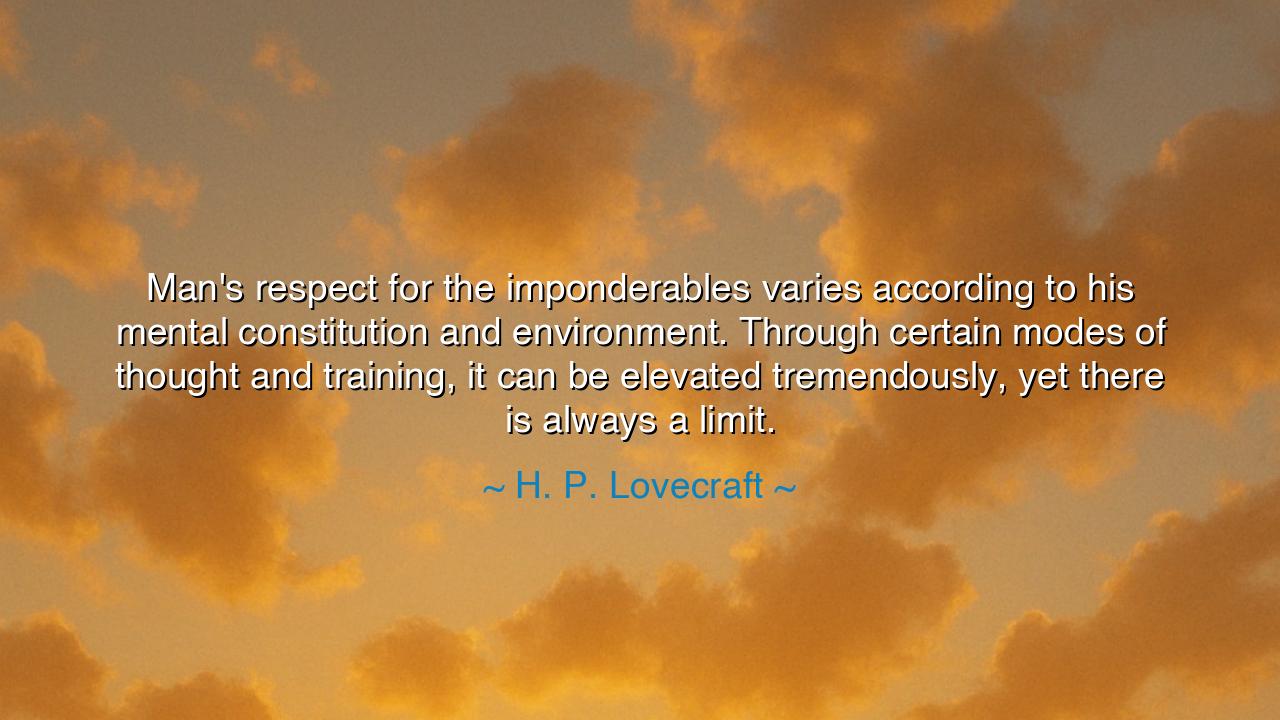
Man's respect for the imponderables varies according to his
Man's respect for the imponderables varies according to his mental constitution and environment. Through certain modes of thought and training, it can be elevated tremendously, yet there is always a limit.






Hear now, O seekers of mystery and mind, the words of H. P. Lovecraft, who wrote: “Man’s respect for the imponderables varies according to his mental constitution and environment. Through certain modes of thought and training, it can be elevated tremendously, yet there is always a limit.” Within this utterance lies the voice of a man who gazed into the abyss of the unknown and found not comfort, but awe. Lovecraft, philosopher of cosmic dread and poet of infinity, speaks here of the imponderables—the unseen forces, the vast mysteries, the truths that lie beyond the reach of reason. He tells us that the human mind, though capable of immense wonder, is also bound by its own nature.
To understand Lovecraft’s words, one must understand the soul of his philosophy: cosmicism. He believed that the universe is vast beyond measure, indifferent to human life, and filled with powers and realities that the mortal mind can scarcely begin to grasp. The imponderables, in his language, are those unknowable aspects of existence—the mysteries of time, death, space, divinity, and consciousness itself. Yet he does not condemn man for his limits; he marvels that through discipline of thought and imagination, man can approach them at all. As he writes, through “certain modes of thought and training,” we may elevate our respect for the unknown to a level of almost sacred reverence.
This is not a warning against curiosity—it is a call to reverent humility. The scientist, the mystic, and the artist each approach the infinite from different paths, and each learns the same truth: the more one knows, the greater the horizon of ignorance becomes. In the words of Isaac Newton, spoken centuries before Lovecraft, “I do not know what I may appear to the world, but to myself I seem to have been only like a boy playing on the seashore… while the great ocean of truth lay all undiscovered before me.” This ocean, these imponderables, are the same abyss that Lovecraft’s imagination wandered through—the endless frontier where human intellect meets its own boundaries.
Consider the story of Prometheus, the Titan who brought fire to mankind. He defied the gods to deliver knowledge, yet his gift came with suffering. For to steal from the heavens is to awaken both illumination and torment. Lovecraft, like Prometheus, understood that knowledge expands the mind but also exposes it to terror—for what man sees, once he peers too far beyond his comprehension, may unmake the very comfort of his existence. The respect he speaks of, then, is not mere admiration, but awe touched by fear—the understanding that creation holds truths too vast for our frail perception to endure.
In his phrase “there is always a limit,” Lovecraft anchors his mysticism in realism. No matter how refined the intellect, the human brain remains bound by biology, by the narrow corridors of sensory perception and cultural conditioning. The philosopher may meditate, the physicist may theorize, the mystic may transcend—but there are truths forever beyond reach, locked in the eternal silence of the cosmos. To acknowledge this is not defeat; it is wisdom. It is the humility of the climber who, reaching the summit of one mountain, beholds the shadow of countless higher peaks stretching into infinity.
The lesson in this reflection is twofold: first, to train the mind to wonder, and second, to temper that wonder with humility. One must cultivate curiosity through learning, reflection, and imagination—but one must also learn reverence for the boundaries that protect sanity and preserve awe. For the greatest danger in human thought is arrogance—the belief that all can be known, all can be mastered. Those who lose respect for the imponderables become blind to the mystery that gives life its depth and meaning.
Practical wisdom flows from this truth. Seek understanding, yes, but let understanding lead you to reverence, not pride. In every field of study—whether science, art, or faith—remember that the unseen, the ineffable, and the infinite are not voids to be conquered but mysteries to be respected. When you gaze upon the stars, when you ponder the silence of death, when you feel the vastness of existence press against your smallness, do not despair. Let awe teach you gentleness. Let ignorance remind you to listen. For in the end, H. P. Lovecraft’s words remind us that wisdom begins not in certainty, but in the reverent acceptance of our limits, and in the eternal, humbling wonder that lies just beyond them.






AAdministratorAdministrator
Welcome, honored guests. Please leave a comment, we will respond soon